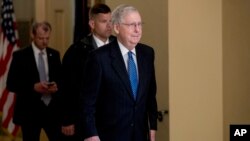In a rare move, Senate Majority Leader Mitch McConnell Republican majority leader says he will attempt to swiftly pass additional funds for small businesses to keep making payroll as Congress rushes to provide more aid during the coronavirus crisis.
The Republican leader plans a vote this week to supplement the $350 billion approved for companies in the just-passed $2.2 trillion rescue package with an immediate additional $250 billion or so, according to GOP operatives. The so-called Paycheck Protection Program "may run dry" without it, McConnell said. Treasury Secretary Steven Mnuchin is expected to outline the request later Tuesday.
The aid is the top GOP priority for an expected fourth coronavirus relief bill. But trying to jam it through a nearly abandoned Capitol without elements sought by Democrats could threaten the fragile political peace going forward. The action is set for Thursday.
Thursday's vote requires unanimous agreement since it's planned for a "pro forma" session that wouldn't typically involve Senate business.
"This program has become overwhelmingly popular," McConnell said in a statement.
"Jobs are literally being saved as we speak. But it is quickly becoming clear that Congress will need to provide more funding or this crucial program may run dry. That cannot happen," he said.
The overture as jobless claims soar to record highs sets up a showdown with Democrats led by Sen. Chuck Schumer of New York who on Tuesday called for up to $25,000 "heroes" pay for frontline health care and service industry workers.
The political lines being drawn threaten a fragile consensus that was emerging between congressional leaders and President Donald Trump on the need for more aid amid the pandemic and its stark economic shutdown.
"We're going to take good care of our people," Trump said Monday at his daily White House briefing. "It was not their fault."
McConnell's move leaps ahead of a broader package that is still being debated but it's unclear if it could win passage in both the Republican-controlled Senate and the Democratic-run House.
House Speaker Nancy Pelosi wants the boost in small business fund as part of much broader aid package topping at least $1 trillion.
But House minority leader, Rep. Kevin McCarthy, R-Ca., backed McConnell's effort for a smaller, discrete infusion for the small business program.
"The House should move swiftly to do the same," he said in a statement.
Already, small businesses can tap forgivable loans of up to $10 million from the federal government to keep making payroll while workers are told to stay home.
The coronavirus crisis has brought the economy to a standstill as businesses shutter under public health efforts to keep people home and prevent the spread of the virus. The economic fallout that is ransacking communities nationwide, a crisis on par with a war effort or the Great Depression.
Schumer's proposal would provide up to $25,000 in hazard pay for the rest of the year for the frontline workers.
Bigger corporations would be expected to foot the bill for the pay hike, he said, while the federal government would provide funding for smaller firms.
Schumer declared the pay hike for nurses, truck drivers, grocery store clerks and others the "highest priority."
Pelosi said Monday she wants another round of direct payments to Americans and is pressing for greater help for state and local governments.
Any votes in Congress remain a logistical conundrum. The House and Senate adjourned for most of the month, as part of strict stay-at-home orders from public health officials to prevent the spread of the highly contagious virus.
The California Democrat has vowed to put the next package together in time for a House vote this month.
Pelosi told House Democrats on a Monday conference call at least another $1 trillion would be needed, according to a person unauthorized to discuss the call and granted anonymity.
Former Federal Reserve chief Janet Yellen joined the private call and warned Democrats the economic fallout will depend on the public health response to the pandemic, the person said. As businesses shutter to stop the virus' spread, it has hurled the U.S. economy toward a recession.
Yellen said it was impossible to know how deep and long the recession would be, and added that it would depend on the health response.
The former Fed chair also told them the nation's unemployment rate is now at least 13% and this week's jobless report will show higher numbers than last week's.
Yellen said she expects a 30 percent contraction of GDP this quarter, but has seen models as high as 50 percent, according to a Democratic aide unauthorized to discuss the call and granted anonymity.
The earlier relief package, approved in late March, included one-time $1,200 direct payments to Americans, along with forgivable small business loans for companies to keep making payroll. It also included a boost of unemployment pay, money for hospitals and a $500 billion fund for bigger corporations and industries.
Pelosi told Democrats said the $1,200 direct payments to Americans and the paycheck protection program for small businesses are not enough and more needs to be done, the person said.
She also said there needs to be more aid through the Supplemental Nutrition Assistance Program, also known as food stamps.
The shifts from the political leaders are stark amid what officials warn could be one of the toughest weeks for the country, as the number of confirmed cases and deaths climbs.
Pelosi, D-Calif., last week also backed off her more sweeping proposals for an infrastructure package to put people back to work, focusing on the more immediate health care and economic needs.
This would be the fourth package from Congress since the start of the virus outbreak. Two initial efforts were followed by the third last month, which was by far the largest, the most ambitious of its kind in U.S. history.




